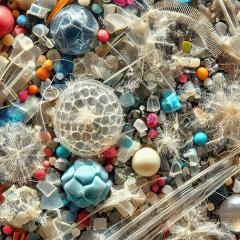Bioprocesses for mitigation of micropollutants in wastewater
Wastewater treatment plants (WWTPs) are known to be sinks for a variety of anthropogenic compounds, including pharmaceuticals and personal care products (PPCPs), pesticides, dyes and other organic chemicals. However, WWTPs are seldom designed to remove these compounds and a great fraction of them ends up being discharged in the final effluent or disposed of with the biosolids. Biological processes comprise an important treatment step where organic matter is removed in WWTPs, therefore providing an opportunity to eliminate micropollutants as well. Being anthropogenic in nature, many micropollutants are not easily broken down by natural enzymes and become recalcitrant or are only partially transformed. Therefore, it is important to design approaches to ensure the adequate biological pathways take place.
I will present an overview of the work that I have been developing to improve micropollutants removal in WWTP biological processes. In initial studies on the occurrence and fate of PPCPs in WWTPs, relevant compounds were identified, including ibuprofen and sulfamethoxazole. The work developed involved fundamental research of the biological mechanisms in isolated strains as well as testing, modelling and optimising mixed culture bioprocesses. Complementary studies were done to identify intermediates generated during the processes, and assess their toxicity.
Being the first time I present to QAEHS, I will also give an overview of my current work as co-theme leader, Environmental Health Microbiology.
Gilda is a Senior Lecturer at UQ and coordinator of the Master of Engineering in Urban Water Engineering. Gilda's research is in the fields of environmental and industrial biotechnology. She has lead research in the areas of N & P removal from wastewater, micropollutants, membrane biofouling, as well as the production of biopolymers (polyhydroalkanoates) from waste/wastewater. One of her major points of interest has been linking microbial ecology to process performance in bioengineering processes. Gilda has published 75 peer reviewed papers to date (H-index 26), and has participated in >30 research projects (5 of which as coordinator). Gilda is a dedicated lecturer and experienced RHD supervisor. She has extensive teaching experience in Chemical/Environmental Engineering and Biotechnology, and she has supervised 13 PhD students (5 ongoing) and 2 post-doc fellows.

